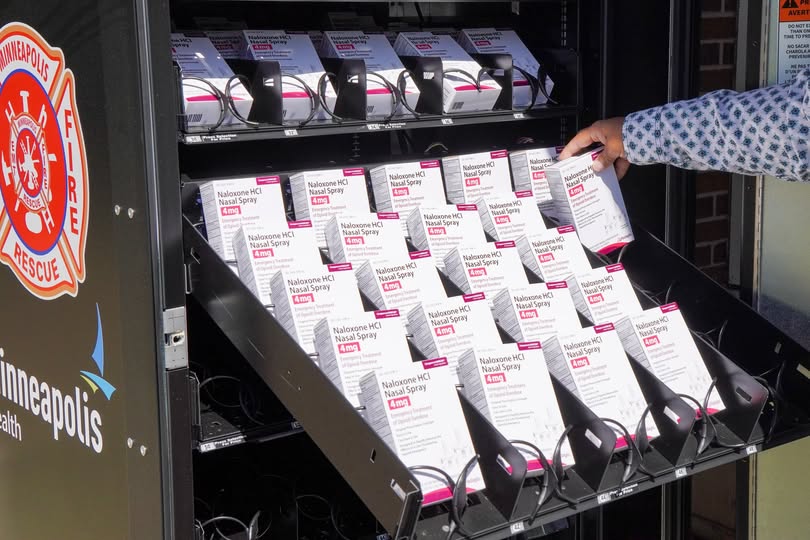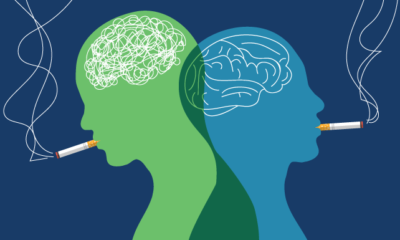Health
Youth Mental Health and Substance Use

Substance use, including tobacco products such as electronic cigarettes, has increased among youth in our community. Starting in middle school, we have seen that vaping has been recognized as something cool that everyone was doing. At one point or another, we all have experienced moments where we felt peer pressure to take up this new thing that all our friends were doing. For instance, we might have heard our friends say it helps them deal with stress and anxiety. A close friend might have told us to “try it” and some of us might have been tempted for a second. In other instances, we have contemplated substance use of any kind because we wanted to fit in a new environment with a new crowd because we thought “how bad can it really be?” However, substance use poses many dangers to your physical health and mental health. By writing this, our goal is to inform not only our peers, the Somali youth, but also our parents and/or guardians about the prevalence of substance use among youth in our community. More people need to acknowledge the extent of this issue that is not only causing significant physical health issues but also worsening the mental health of our youth.
Vaping by Somali youth has increased significantly in recent years, and starts as early as middle school. At this age, peer pressure can make vaping seem “cool” and lead to youth using it to fit in with their peers. However, vaping at this age primes the developing brain for more substance use such as Marijuana or other harmful substances which can result in serious mental health issues. A 2017 report on substance use found that Somali youth in middle school and high school are more likely to use illicit drugs and misuse prescription medication in the state of Minnesota than their non-Somali peers. Consequently, many of our Somali youths are struggling with mental health issues.
What a lot of youth are not well-informed about are the serious health problems that vaping and substance use can cause. Besides addiction, substance use can cause long term health issues that are often irreversible. For example, most vaping products, such as JUUL, contain high levels of nicotine, which is the drug found in tobacco products to make them addictive. A single JUUL pod contains at least as much nicotine as a pack of 20 regular cigarettes. Nicotine is quickly absorbed into the body and goes directly to the brain. It activates areas of the brain that make you feel satisfied and happy, so the person using these products may think that vaping is helping them when in reality, it is just providing a temporary feeling that will make the person addicted and only worsen their mental health. Besides nicotine, e-cigarette aerosol and flavorings can contain cancer-causing chemicals, heavy metals, and ultrafine particles that can be inhaled deeply into the lungs and harm your body.
Nicotine in vaping products is dangerously addictive and can lead to other addictions to different tobacco products or other harmful substances. Substance use might provide temporary happy sensations, excitement or relaxation, but it impacts your body, thoughts, feelings, behaviors, and even affects the loved ones around you. Continued substance use can cause serious health issues such as lung disease, liver problems, and increased risk for stroke. It can also drastically change your physical appearance and cause or worsen mental health.
Therefore, when it comes to stress, anxiety or any other issues with mental health, it is important to find healthy ways of coping, rather than turning to substance use. Find practical ways that work for you to quiet the noise inside your mind and the world around you. For example, try going on a walk, taking time off from technology, and surrounding yourself with nature. You can also try mindfulness, a type of meditation that helps you focus and be aware of what you are feeling at that moment. It is important to engage in other productive activities such as art, sports, or learning a new skill to fill your time. Engage in activities that also help you avoid isolation and keep you connected with your family and friends, such as sharing a meal or taking a walk with someone.
Our community, both adults and youth, should unite as one to fight against these dangerous products and poisonous advertisements that target the youth in our community. We should stand up against this problem and provide a safe environment that promotes healthier coping strategies. For our parents and guardians, we want to say that communication is very important. Most youths might be afraid of being judged by family or friends when they talk about their addiction or seek help with their mental health problems. The more we engage in open communication within ourselves and our community, the more we can understand what our youth are going through and provide them with the help they need. We need to you create a space where we feel safe and cared for so we can tell you about our problems and come to you for help.
For our peers, be careful with your choices. Remember that your brain is developing until the age of 25, so you wouldn’t want to negatively affect your brain during this important developmental stage. Keep your brain as healthy as you possibly can by staying away from substance use of any kind. Always stand by your choice to refuse drugs. Saying no takes courage and practice and you should not feel guilty about putting your health and safety first. We’ve all experienced some sort of peer pressure, but remember that you are your own person. You are living for yourself, not others, so think about what’s right for you and don’t let what others do dictate your choices. Be yourself, no matter what. Always remember that a true friend should respect a friend’s choice to say “no”. If your friends are not willing to understand, then you likely have the wrong friends.
Written by:
Aisha Mohamud
Mumtaza Mohamed
Socaad Haille
WellShare International
Health
City of Minneapolis Launches First NARCAN Vending Machine on the Northside

Minneapolis – In a groundbreaking effort to expand access to life-saving overdose intervention tools, the Minneapolis Health Department, in partnership with Hennepin County, has installed the first NARCAN vending machine in North Minneapolis. The machine is located at Fire Station 14, which also operates as the City’s Safe Station—a trusted and welcoming space for individuals seeking help with substance use and recovery.

The vending machine is stocked with more than 100 boxes of NARCAN, with each box containing two doses of the opioid overdose reversal medication. It is accessible 24/7 and available at no cost—no ID, insurance, or appointments required.
Fire Station 14 serves as more than just an emergency response hub—it’s a point of connection. Those who walk through its doors can access peer recovery specialists and a network of support services aimed at helping people take the next step in their recovery journey.
Support is here, and it’s closer than you think. By putting tools like NARCAN directly into the hands of community members, Minneapolis is taking a vital step toward building healthier, more resilient neighborhoods.
Watch the announcement: https://www.youtube.com/live/K6HeebdcXL0
Find resources: https://www.minneapolismn.gov/…/current-concerns/opioids/

Health
E. coli O157 infections linked to consumption of burgers from Twin Cities restaurants

Health officials are urging people to contact their health care provider if they ate a hamburger, especially if undercooked, at a table-service restaurant since Oct. 31 and then developed diarrhea, particularly bloody diarrhea, in the following week.
The Minnesota Department of Health (MDH) has identified 10 cases of E. coli O157 infection in people who had eaten burgers at multiple locations of Red Cow, a table-service restaurant chain with locations in Hennepin, Ramsey and Olmsted counties. One additional case reported dining at Hen House Eatery in Minneapolis, which received the same ground beef product suspected in this investigation. The ground beef product was also distributed to other establishments, so additional cases from other locations could be identified.
So far, cases have reported meal dates of Oct. 31 through Nov. 7, and illness onset dates range from Nov. 4 through Nov. 9. Cases range in age from 9 to 70 years. Two cases have been hospitalized. Additional potential cases are under investigation.
Red Cow and Hen House Eatery owners are fully cooperating with the investigation and have made multiple changes, including product changes, to prevent further illnesses. MDH is working with the Minnesota Department of Agriculture and multiple local environmental health agencies during this ongoing investigation.
Symptoms of illness caused by E. coli O157 typically include stomach cramps and diarrhea, often with bloody stools, but only a low-grade or no fever. People typically become ill two to five days after exposure, but this period can range from one to eight days. Most people recover in five to 10 days. However, about 5% of E. coli O157 infections lead to hemolytic uremic syndrome (HUS), a severe complication that involves acute kidney failure and other severe problems. Treatment with fluids can help prevent HUS, but E. coli O157 gastroenteritis should not be treated with antibiotics, which can increase the likelihood of HUS.
Anyone who believes they may have developed an E. coli O157 infection should contact their health care provider.
Approximately 100 cases of E. coli O157 infection are reported each year in Minnesota. More information on E. coli O157 and how to prevent it can be found on the MDH E. coli website.
-MDH-
Health
Effects of Tobacco on Mental Health

Background
Historical development of the conversations regarding mental health have not been progressing as rapidly as one would prefer. We have gained greater knowledge about mental illness over the last 20 years, and the majority of us now believe that therapy works. But there’s a growing societal perception that those with mental illness are unpredictable and dangerous.Studies have indicated that smoking exacerbates stress and anxiety. Smokers believe smoking lowers stress and anxiety because nicotine instantly relaxes them. This sensation is fleeting and is quickly followed by cravings and withdrawal symptoms. Furthermore, there is a great deal of stigma attached to drug addiction problems, and people often blame those who are ill for their habits. Many people are hesitant to seek treatment or disclose their disease in public due to these misconceptions and biases.
Understanding the Chemical Effect
Dopamine is released in the brain in response to stimulation by nicotine. Dopamine has a role in eliciting happy emotions. People with depression frequently have low levels of it, and as a result, they may smoke cigarettes to momentarily boost their dopamine levels. Smoking, however, causes the brain to turn off the process by which it produces dopamine, which eventually results in a decrease in supply and an increase in smoking.When trying to quit smoking, people with depression may find it very difficult and have more acute withdrawal symptoms. Never forget that if you want to stop, there is a ton of help available. You don’t have to experience it alone, though.
Coping and Seeking Help
Avoid isolating yourself. It’s possible that you’re reluctant to disclose your mental health condition to others. If your loved ones, friends, clergy, or neighbors are aware of your mental health condition, they can help you. Seek the empathy, understanding, and support you require from those you can trust. There is a misplaced stigma in the East African community when it comes to mental illness. However, this should not stop one from seeking the help they need.
Support from friends and family might make quitting smoking easier. Encourage your friends or cohabitants who smoke to quit smoking if you live with them. Even for people who have managed to abstain from smoking for more than a year, having a mental illness at the time of quitting increases the likelihood of relapsing into smoking. For the same reasons that others have mentioned (health and family), many smokers with mental illnesses wish to stop, but they may be more susceptible to relapse due to stress and other unpleasant emotions.
Article by WellShare International
-

 Local News7 months ago
Local News7 months agoFrom First to Forefront: Omar Fateh’s DFL Endorsement for Minneapolis Mayor Marks a 25-Year Somali American Political Journey
-

 Community7 months ago
Community7 months agoKhadka Caawinta Qaxootiga iyo Soo Galootiga: Wac maanta si aad u hesho macluumaad iyo ilo xogo
-

 Local News11 months ago
Local News11 months agoCouncilmember Osman’s Statement on Violence Interrupter Services in Cedar Riverside and Elliot Park
-

 Local News9 months ago
Local News9 months agoLake Street Lift Launches “Lake of 10,000 Lands” Campaign
-

 Health9 months ago
Health9 months agoCity of Minneapolis Launches First NARCAN Vending Machine on the Northside
-

 Local News9 months ago
Local News9 months agoMinneapolis Vows to Advance Police Reforms Despite DOJ Move to Dismiss Consent Decree
-

 Local News9 months ago
Local News9 months agoMore than 6,000 drivers cited for prioritizing phones over safety during distracted driving enforcement campaign
-

 Community11 months ago
Community11 months agoTibyan Center Hosts Successful Iftar Dinner at New Facility in Saint Anthony












